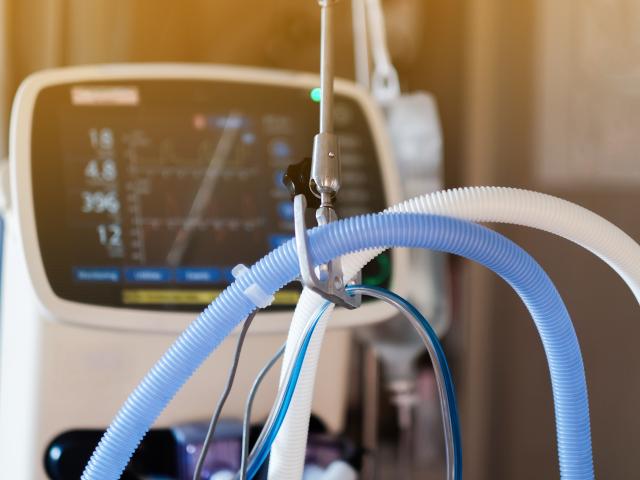
Welsh researchers contribute to lifesaving ventilation study for COVID-19 patients
12 August
RECOVERY-RS trial finds treatment with Continuous Positive Airway Pressure (CPAP) reduces the need for COVID-19 patients to be admitted to ICU on a ventilator.
Research teams in Wales have contributed to a landmark trial conducted in hospitals across the UK, compared continuous positive airway pressure (CPAP), high flow nasal oxygenation (HFNO) and standard oxygen therapy.
RECOVERY-RS led by the University of Warwick and Queen’s University Belfast is the world’s largest non-invasive respiratory support trial for COVID-19 and found CPAP treatment reduced patients’ likelihood of needing a ventilator compared to those receiving standard oxygen therapy - which equates to around one person in every 12 avoiding the need for intensive care.
The trial was funded by the National Institute for Health and Care Research (NIHR) with the Welsh effort coordinated by Health and Care Research Wales. More than 1,200 participants took part from across 48 UK hospitals which included three Welsh sites - Aneurin Bevan University Health Board, Cwm Taf Morgannwg University Health Board and Betsi Cadwaladr Health Board.
Between April 2020 and May 2021, a total of 1,272 COVID-19 patients over the age of 18 admitted to hospital with acute respiratory failure were recruited to the study. Participants were randomly allocated to receive one of the three oxygen treatments. 380 (29.9%) participants received CPAP; 417 (32.8%) participants received HFNO; and 475 (37.3%) received conventional oxygen therapy.
Results showed there was no difference between HFNO and standard oxygen therapy. However, CPAP was found to be the superior intervention reducing patients’ likelihood of needing invasive mechanical ventilation compared to those receiving HFNO or standard oxygen therapy.
Almost 100 participants from Wales were involved in the study, with Aneurin Bevan’s Principal Investigator Dr Sara Fairbairn, supported by the research delivery team, recruiting 77 participants.
Sara’s contribution was recognised by the RECOVERY-RS team who invited her to be co-author of the recent paper which stated CPAP should be considered for hospitalised patients with COVID-19 needing oxygen therapy - reducing the need for invasive ventilation and relieving pressure on intensive care services.
Principal Investigator and Consultant Chest Physician at Aneurin Bevan University Health Board, Dr Sara Fairbairn said: “I’m very proud of the whole research and clinical team that delivered this trial within ABUHB. We embedded the trial within our clinical pathways supported by all staff and the critical care unit. It is testament to all involved, and I am pleased that the contribution from ABUHB has been acknowledged.”
Assistant Director of Research and Development at Aneurin Bevan University Health Board, Jeanette Wells said: “I’m immensely proud of the research delivery team in Aneurin Bevan who had such an impact on this important trial. Principal Investigator Dr Sara Fairbairn made such a significant contribution on behalf of Wales and we’re pleased her hard work was recognised by being asked to co-author the paper.
“The research delivery team in Aneurin Bevan have worked tirelessly throughout the pandemic to deliver urgent public health studies and seeing results such as these makes it all worthwhile.”
Dr Nicola Williams, Director of Support and Delivery at Health and Care Research Wales which oversees all COVID-19 research in Wales, said: “Wales has made such a significant contribution to a multitude of COVID-19 research happening across the country, from vaccine development to drug trials, and this result is just one of many which will make a difference to patient care.
“We’re proud to have contributed in such a valuable way and have the best Welsh scientists and researchers at the heart of this national study. We also want to thank the participants and their families for their trust and cooperation, their selfless nature will be sure to save lives in the future.”